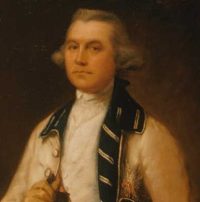Third. The weather became moderate. At daylight the battery was opened against the left face of the bastion of St. Diego, towards the saliant angle. One hundred seamen were appointed to assist the corps of artillery in this service. Our cannon, by the most excellent skill and management of Maj. Barker, and the officers under him, were served with such justness, quickness, and dexterity, that the twelve pieces on that face of the bastion were silenced in a few hours, and the Spaniards drove from them. We had but two men killed. At night we began a battery for three guns, on the left of our place of arms, to silence those that were in barbet upon the orillon of the bastion of St. Andrew, which annoyed our flank. We maintained a brisk fire of grape and musketry all the night, to prevent the enemy from repairing their embrasures and remounting the cannon. The mortars, now augmented to seven, were kept constantly playing upon the gorge of the bastion, and the contiguousdefences.
*^ “In Manila was a Beata who lived on the alms sent her from
Mexico, or those which she collected in Manila. She maintained
and supported a certain number of girls, who consented to retire
with her and to lead the same manner of life – that is to say, a life
of retreat and repentance. They followed the rules of no particu-
lar order. That community did not have the approbation of the
court of Rome, but that did not prevent it from being tolerated,
and even from being in excellent odor. She was called Mother
Paula. The fiscal had much confidence in her, and sent the
greatest part of his possessions to the house of this woman. This
Beata assured him that Manila would not fall; that the English
w^ere all going to become Catholics; and that the fulfilment of
her prediction would speedily be seen. The fiscal believed her.
Completely enthused, he went to find the archbishop. *Sir,’ said
he, on saluting him, ‘we have nothing to fear; I have just left’
Mother Paula; the English are all going to be converted to the
faith ; we shall drink excellent wine at their expense.’ ” See Le
Gentil, ii, pp. 240, 241.
